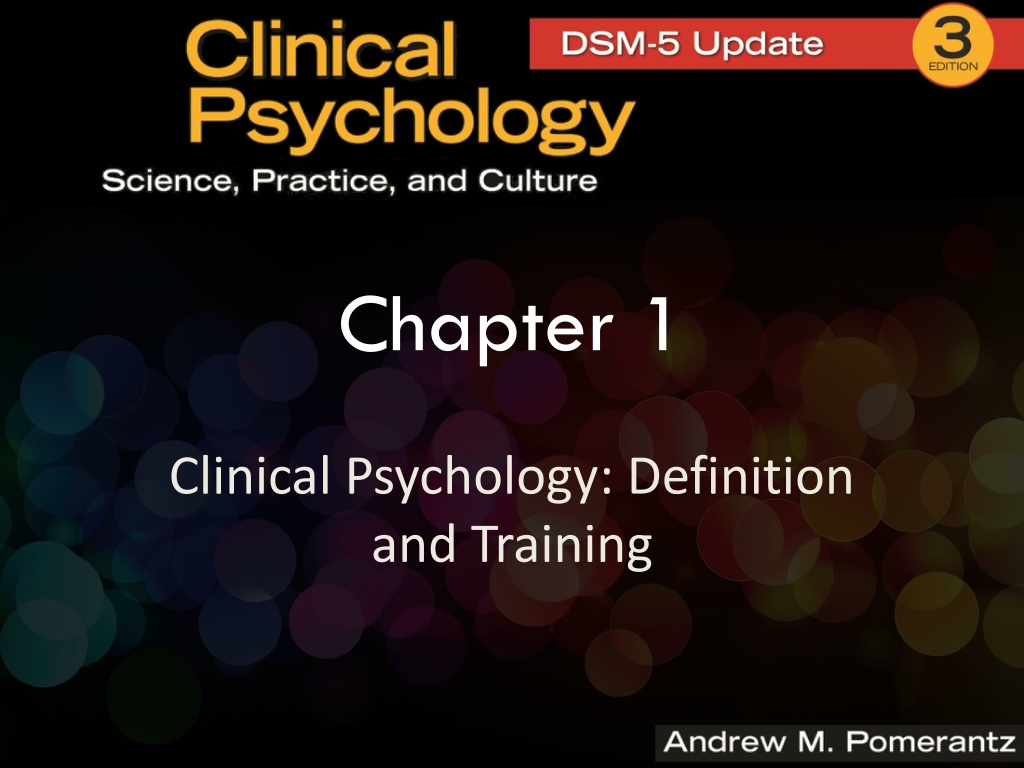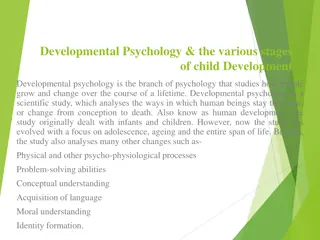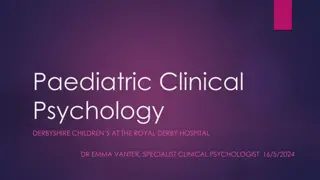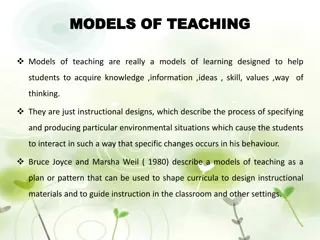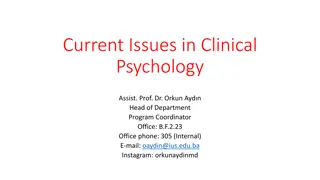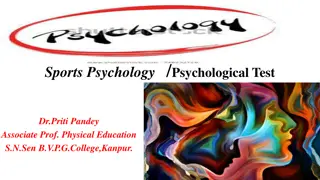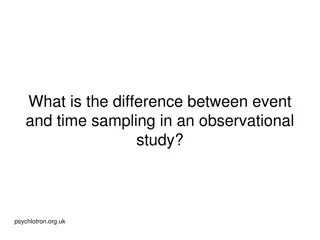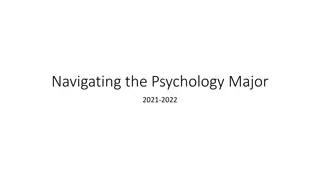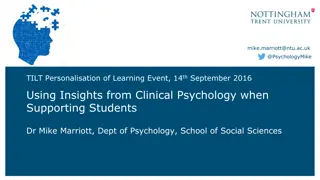Understanding Clinical Psychology: Definition, Training, and Models
Clinical psychology, first introduced in 1907, encompasses a diverse field focusing on the study, assessment, and treatment of psychological issues. The APA Division 12 defines clinical psychology as integrating science, theory, and practice to understand and alleviate maladjustment. Training typically involves a doctoral degree, coursework, and internships. Specialized tracks, like child health and forensic psychology, have emerged. Three main training models include the scientist-practitioner model, practitioner-scholar model, and clinical scientist model, each emphasizing a balance of practice and research.
Uploaded on Sep 25, 2024 | 0 Views
Download Presentation

Please find below an Image/Link to download the presentation.
The content on the website is provided AS IS for your information and personal use only. It may not be sold, licensed, or shared on other websites without obtaining consent from the author. Download presentation by click this link. If you encounter any issues during the download, it is possible that the publisher has removed the file from their server.
E N D
Presentation Transcript
Chapter 1 Clinical Psychology: Definition and Training
Clinical Psychology Clinical psychology first used in 1907 by Lightner Witmer Originally defined as similar to medicine, education, and sociology
More Recent Definitions Tremendous growth has resulted in a very broad, hard-to-define field Brief definitions emphasize the study, assessment, and treatment of people with psychological problems More detailed definitions (e.g., Division 12 of APA) are more inclusive and descriptive
APA Division 12 Definition of Clinical Psychology The field of Clinical Psychology integrates science, theory, and practice to understand, predict, and alleviate maladjustment, disability, and discomfort as well as to promote human adaptation, adjustment, and personal development. Clinical Psychology focuses on the intellectual, emotional, biological, psychological, social, and behavioral aspects of human functioning across the life span, in varying cultures, and at all socioeconomic levels. (APA, 2012)
Education and Training in Clinical Psychology Commonalities among most training programs Doctoral degree Most enter with bachelor s, some with master s degree Required coursework Thesis/dissertation Predoctoral internship (more information in later slides)
Education and Training: Specialty Tracks In recent decades, specialty tracks have emerged, including: Child Health Forensic Family Neuropsychology More on these specialty areas in later chapters
Three Models of Training Scientist-practitioner model (or Boulder model) Practitioner-scholar model (or Vail model) Clinical scientist model
Scientist-Practitioner Model (Boulder Model): Balancing Practice and Science Created in 1949 at a conference in Boulder, Colorado of directors of clinical psychology training programs Emphasizes both practice and research Graduates should be able to competently practice (e.g., therapy, assessment) and conduct research A balanced approach
Practitioner-Scholar Model (Vail Model): Emphasizing Practice Created in 1973 in a conference in Vail, Colorado Also known as practitioner-scholar model Emphasizes practice over research Yields the Psy.D. degree (not the traditional Ph.D.) Higher acceptance rates and larger classes Proliferated in recent years
Ph.D. vs Psy.D. Emphasize practice over research Larger classes Greater acceptance rate Often in free-standing professional schools Offer less funding to students Less success in placing students in APA- accredited internships Emphasize practice and research Smaller classes Lower acceptance rate Typically in university departments Offer more funding to students Greater success in placing students in APA- accredited internships
Clinical Scientist Model: Emphasizing Research Emerged in 1990s, primarily as a reaction against the trend toward practice represented by Vail model Richard McFall s 1991 Manifesto for a Science of Clinical Psychology sparked this movement A subset of Ph. D. institutions who strongly endorse empiricism and science Tend to train researchers rather than practitioners
Emerging Trends in Training Technology Use of webcams for supervision Computer-based assessment Competencies Skills that a student must demonstrate Ex. Intervention, assessment, research, etc.
Sample Grad Program Website Self-Description Boulder model example: University of Alabama graduates function in a variety of settings as teachers, researchers, and providers of clinical services The program emphasizes the integration of scientific knowledge and the professional skills and attitudes needed to function as a clinical psychologist in academic, research, or applied settings.
Sample Grad Program Website Self-Description Vail model example: Chicago School of Professional Psychology As a professional school, our focus is not strictly on research and theory, but on preparing students to become outstanding practitioners, providing direct service to help individuals and organizations thrive.
Sample Grad Program Website Self-Description Clinical scientist model example: Indiana University Indiana University s Clinical Training Program is designed with a special mission in mind: To train first-rate clinical scientists applicants with primary interests in pursuing careers as service providers are not likely to thrive here.
Getting in to Graduate School in Clinical Psychology Know your professional options Take the appropriate undergraduate courses Get to know your professors Get research experience Get clinically relevant experience Maximize your GRE score Select graduate programs wisely Write effective personal statements Prepare well for admissions interviews Consider your long-term goals
Internships: Predoc and Postdoc Predoctoral internship Takes place at the end of doctoral training programs (before Ph.D. or Psy.D. is awarded) A full year of supervised clinical experience in an applied setting An apprenticeship of sorts, to transition from student to professional
Internships: Predoc and Postdoc Postdoctoral internship Takes place after the doctoral degree is awarded Typically lasts 1-2 years Still supervised, but more independence Often specialized training Often required for state licensure
Getting Licensed Licensure enables independent practice and identification as a member of the profession Requires appropriate graduate coursework, postdoctoral internship, and licensing exams Each state has its own licensing requirements To stay licensed, most states require continuing education units (CEUs)
Where Do Clinical Psychologists Work? A variety of settings, but private practice is most common True since 1980s Other common work settings include Universities Psychiatric and general hospitals Community mental health centers Other settings
What do Clinical Psychologists Do? A variety of activities, but psychotherapy is most common True since 1970s Other common professional activities include: Diagnosis/assessment Teaching/supervision Research/writing Other activities
How Are Clinical Psychologists Different From Other Professionals? Counseling Psychologists: Tend to see less seriously disturbed clients Tend to work less often in settings like inpatient hospitals or units Tend to endorse humanism more and behaviorism less Tend to be more interested in vocational and career counseling
How Are Clinical Psychologists Different From Other Professionals? Psychiatrists: Go to medical school and are physicians Have prescription privileges (this is changing for clinical psychologists see Chapter 3) Increasingly emphasize biological/pharmaceutical rather than talk therapy intervention
How Are Clinical Psychologists Different From Other Professionals? Social Workers Tend to emphasize social factors in client s problems Earn a master s degree rather than a doctorate Training emphasizes treatment and fieldwork over research or formalized assessment
How Are Clinical Psychologists Different From Other Professionals? School Psychologists: Tend to work in schools Tend to have a more limited professional focus than clinical psychologists (student wellness and learning) Frequently conduct school-related testing and determine LD and ADHD diagnoses Consult with adults in children s lives (e.g., teachers, staff, parents)
How Are Clinical Psychologists Different From Other Professionals? Professional Counselors: Earn a master s degree Complete training in two years Little emphasis on psychological testing or research May specialized in career, school, college counseling
